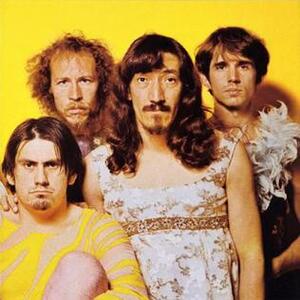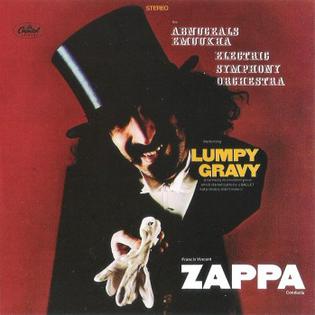Related Research Articles

We're Only in It for the Money is the third studio album by American rock band the Mothers of Invention, released on March 4, 1968 by Verve Records. As with the band's first two efforts, it is a concept album, and satirizes left and right-wing politics, particularly the hippie subculture, as well as the Beatles' album Sgt. Pepper's Lonely Hearts Club Band. It was conceived as part of a project called No Commercial Potential, which produced three other albums: Lumpy Gravy, Cruising with Ruben & the Jets, and Uncle Meat.

Fart lighting also known as pyroflatulenceflatus ignition or fire breathing dragon is the practice of igniting the gases produced by human flatulence often producing a flame of a blue hue hence the act being known colloquially as a "blue angel", "blue dart" or in Australia, a "blue flame". The fact that flatus is flammable and the actual combustion of it through this practice gives rise to much humorous derivation. Other colors of flame such as orange and yellow are possible with the color dependent on the mixture of gases formed in the colon. In order to "fire fart" one must have a fart prepared in the rectum and a lighter at the ready. Then they fart onto the lighter.

Dweezil Zappa is an American rock guitarist and occasional actor. He is the son of musical composer and performer Frank Zappa. Exposed to the music industry from an early age, Dweezil developed a strong affinity for playing the guitar and producing music. Able to learn directly from guitarists such as Steve Vai and Eddie Van Halen, Dweezil released his first single at the age of 12.

Freak Out! is the debut studio album by American rock band the Mothers of Invention, released on June 27, 1966, by Verve Records. Often cited as one of rock music's first concept albums, it is a satirical expression of frontman Frank Zappa's perception of American pop culture and the nascent freak scene of Los Angeles. It was also one of the earliest double albums in rock music, as well as the first two-record debut album. In the UK, the album was originally released as an edited single disc.

Them or Us is an album by American musician Frank Zappa, released in October 1984 by Barking Pumpkin Records.

Lumpy Gravy is the debut solo album by Frank Zappa, written by Zappa and performed by a group of session players he dubbed the Abnuceals Emuukha Electric Symphony Orchestra. Zappa conducted the orchestra but did not perform on the album. It is his third album overall: his previous releases had been under the name of his group, the Mothers of Invention.

Cruising with Ruben & the Jets is the fourth studio album by the Mothers of Invention. Released on December 2, 1968, on Bizarre and Verve Records with distribution by MGM Records, it was subsequently remixed by Frank Zappa and reissued independently.

Ship Arriving Too Late to Save a Drowning Witch is an album by Frank Zappa, released in May 1982 and digitally remastered in 1991. It features five tracks composed by Zappa, and one song, "Valley Girl", co-written with his daughter, Moon Unit Zappa, then a teen, who provided the spoken monologue mocking Valley girls, including phrases like "Gag me with a spoon!".

The Mothers of Invention were an American rock band from California. Formed in 1964, their work is marked by the use of sonic experimentation, innovative album art, and elaborate live shows.

Thing-Fish is an album by Frank Zappa, originally released as a triple album box set on Barking Pumpkin Records in 1984. It was billed as a cast recording for a proposed musical of the same name, which was ultimately not produced by Zappa, but later performed partially in 2003, ten years after his death.

Mothermania (1969), subtitled The Best of the Mothers, is a compilation album by the Mothers of Invention. While the songs were previously released on Freak Out!, Absolutely Free and We're Only in It for the Money, it contains unique mixes or edits made specifically for this compilation.

You Can't Do That on Stage Anymore, Vol. 3 is a double disc live album by Frank Zappa, spanning from December 10, 1971 to December 23, 1984. It was released in 1989.

Frank Zappa Meets the Mothers of Prevention is a 1985 album by Frank Zappa. The album was originally released in two slightly different versions in the US and Europe.

Guitar is a 1988 live album by Frank Zappa. It is the follow-up to 1981's Shut Up 'n Play Yer Guitar; like that album it features Zappa's guitar solos excerpted from live performances, recorded between 1979 and 1984. It garnered Zappa his sixth Grammy nomination for "Best Rock Instrumental Performance".
Barking Pumpkin Records is an American independent record label based in California, United States, that specialized in mail order releases. The label was founded in 1980 by Frank Zappa, who named it after his wife's smoker's cough when she tried to quit the habit.
Pal Recording Studio (1957–1964) was an independent recording studio that operated in Cucamonga, California The studio was started by engineer/innovator Paul Buff. The studio is known for its instrumental Surf music recordings such as "Wipe Out" and the original demo recording of "Pipeline". The first location was at 8020 North Archibald Avenue. Later, the studio moved down the street to 8040.
"The Return of the Son of Monster Magnet" is a Frank Zappa composition, performed by The Mothers of Invention, released on the Mothers' debut album, Freak Out!. It is the longest song on the album, at 12:17, consisting of 2 parts: "Ritual Dance Of The Child-Killer", and "Nullis Pretii ". The composition includes a musical quote from "Louie Louie".
"Trouble Every Day" is a song by the Mothers of Invention, released on their 1966 debut album Freak Out!
Jim "Motorhead" Sherwood was an American rock musician notable for playing soprano, tenor and baritone saxophone, tambourine, vocals and vocal sound effects in Frank Zappa's Mothers of Invention. He appeared on all the albums of the original Mothers line-up and the 'posthumous' releases Burnt Weeny Sandwich and Weasels Ripped My Flesh, as well as certain subsequent Zappa albums. He also appeared in the films 200 Motels, Video from Hell and Uncle Meat.

Inside Pop: The Rock Revolution is a 1967 American television documentary by David Oppenheim about young pop and rock musicians producing music as "a symptom and generator" of social unrest and generation gaps. Hosted by Leonard Bernstein, it was commissioned by CBS and broadcast on April 25, 1967. Inside Pop followed other TV programs dedicated to contemporary rock, such as a 1966 ABC News special titled Anatomy of Pop, but Oppenheim's documentary represented the first time that pop music had been presented on television as a genuine art form. This acknowledgement coincided with a newfound appreciation, by cultural commentators and scholars, of the advances that the Beatles and other contemporary artists had made during the 1960s.
References
- ↑ "Phase 315 of we're only in it for the money censorship". Archived from the original on December 20, 2012. Retrieved July 16, 2006.CS1 maint: discouraged parameter (link)
- ↑
- Zappa, Frank; Peter Occhiogrosso (1989). "Boogers from Hell". The Real Frank Zappa Book . New York City: Poseidon Press. pp. 85–87. ISBN 0-671-70572-5.
- ↑ http://www.arf.ru/Notes/Woiftm/tblack.html Notes and comments at www.arf.ru [ unreliable source? ]
- ↑ "Dictionary of marijuana-related terms which gives the meaning of "bomber" as simply an alternate name for a standard marijuana cigarette". Alternatesmoke.com. Archived from the original on 2012-07-17. Retrieved 2010-10-05.CS1 maint: discouraged parameter (link)